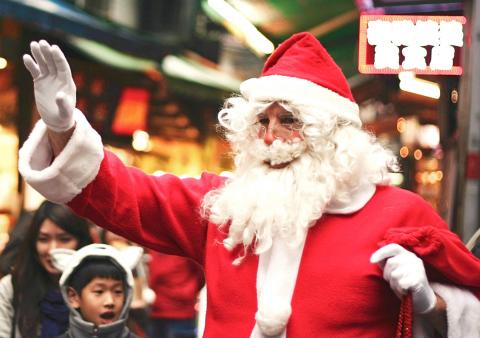The road to recovery has been slow for the Aboriginal residents of Wulai (烏來) in New Taipei City, many of whom have been affected by the typhoons earlier this year. But this Sunday, Santa will be spreading some holiday cheer to the town’s youngest residents, handing out toys and donated school supplies, as well as leading a group of pint-sized carolers.
The idea behind “Christmas in Wulai” started in 2011 with long-time Taipei expat Gary Smoke. As a Vietnam War veteran, Smoke says he’s seen what people are capable of doing to each other and wanted to contribute something meaningful to the community he was living in for a change. At the time, Smoke was also collecting instructional books recycled by English teachers in Taiwan who left their jobs when he met Tony Coolidge (he’s also a contributor for the Taipei Times). Coolidge was born in Wulai to an Atayal Aboriginal mother and American serviceman father and had just returned to Taiwan to rediscover his roots. Like Smoke, Coolidge also felt compelled to give back to the community.
“I said, ‘hey, why don’t we put on a Christmas show up in Wulai?’” Smoke says. “The rest is history.”

Photo courtesy of Maciej Korbas
Smoke now serves as the international relations director at Coolidge’s Taiwan-based non-profit organization, Atayal, which aims to connect indigenous people around the world. In the past, they’ve arranged for musicians, storytellers and children’s choirs from nearby churches to perform outside of Wulai Atayal Museum, and this year’s event will be just as boisterous.
“I’ll walk down the streets in my Santa suit handing out candy and people will stop and hand me their babies, asking me to pose so that they can get a picture of Santa with their baby,” Smoke tells me.
Santa and his helpers will hand out Christmas bells and clappers to children, encouraging them to dance. Although some might initially be too shy to join in, most eventually come around.
“Once people know Santa is here, the crowd is just in frenzy mode,” Smoke adds.
Besides organizing the yearly Christmas event, Smoke is trying to implement new programs in Wulai that will have more long-lasting change. One idea is to do a walking tour of Wulai led by a local Atayal guide and accompanied by an English translator. Another is to develop the library in the museum by donating his English textbooks and converting the place into a learning center. Finally, Smoke also wishes to start a soccer tournament in Wulai that will bring together Atayal children and students from international schools.
Smoke says that all the projects are intertwined and have to do with children of different backgrounds coming together and learning from one another. In particular, the idea to host soccer tournaments came from the English-language basketball camps Coolidge had been organizing for children in Tainan.
“Our expectations are high and it’s all contingent on collaborating with Wulai’s Atayal community,” Smoke says.

Taiwan has next to no political engagement in Myanmar, either with the ruling military junta nor the dozens of armed groups who’ve in the last five years taken over around two-thirds of the nation’s territory in a sprawling, patchwork civil war. But early last month, the leader of one relatively minor Burmese revolutionary faction, General Nerdah Bomya, who is also an alleged war criminal, made a low key visit to Taipei, where he met with a member of President William Lai’s (賴清德) staff, a retired Taiwanese military official and several academics. “I feel like Taiwan is a good example of

March 2 to March 8 Gunfire rang out along the shore of the frontline island of Lieyu (烈嶼) on a foggy afternoon on March 7, 1987. By the time it was over, about 20 unarmed Vietnamese refugees — men, women, elderly and children — were dead. They were hastily buried, followed by decades of silence. Months later, opposition politicians and journalists tried to uncover what had happened, but conflicting accounts only deepened the confusion. One version suggested that government troops had mistakenly killed their own operatives attempting to return home from Vietnam. The military maintained that the

Taipei Mayor Chiang Wan-an (蔣萬安) announced last week a city policy to get businesses to reduce working hours to seven hours per day for employees with children 12 and under at home. The city promised to subsidize 80 percent of the employees’ wage loss. Taipei can do this, since the Celestial Dragon Kingdom (天龍國), as it is sardonically known to the denizens of Taiwan’s less fortunate regions, has an outsize grip on the government budget. Like most subsidies, this will likely have little effect on Taiwan’s catastrophic birth rates, though it may be a relief to the shrinking number of

Since its formation almost 15 years ago, Kaohsiung rock band Elephant Gym (大象體操) has shattered every assumption about contemporary popular music, and their story is now on screen in a documentary titled More Real Than Dreams. It’s an unlikely success story that says a lot about young people in Taiwan — and beyond. For a start, their sound is analog. In the film, guitarist Tell Chang (張凱翔) proudly says: “There is no AI in our sound.” His sister, bass player KT Chang (張凱婷) is the true frontwoman — less for her singing abilities than for her thunderous sound on the instrument. Fast like